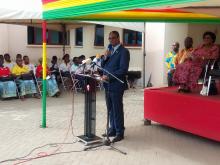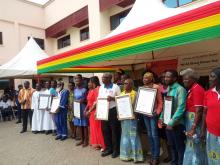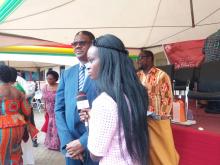Ghana commemorates World Blood Donor Day; Safe blood for all.
On 14 June 2019, Ghana joined the global community to celebrate World Blood Donor Day. The theme of this year’s campaign, "Blood Donation and Universal Access to Safe Blood Transfusion" seeks to ensure that people living in Ghana have access to adequate blood and blood products, which are of sufficient quality and without exposure to financial hardship. The theme also focuses on blood donation and universal access to safe blood transfusion as a means of achieving universal health coverage and strongly encourages more people all over the world to become blood donors and donate blood regularly.
World Blood Donor Day is set aside to appreciate voluntary, unpaid blood donors for their life-saving gift of blood. It is also to raise awareness of the need for regular blood donations to ensure access to affordable and timely supplies of safe and quality blood and blood products by patients suffering from life-threatening conditions.
Delivering the keynote address at this year’s celebration, the Honourable Deputy Minister for Health, Mrs. Tina Mensah revealed that the Ministry of Health has reviewed and submitted the National Blood Service Bill to cabinet for consideration and final approval by Parliament. She indicated that the Bill when passed into law would improve the regulatory regime for the provision of blood services throughout the country.
Mrs Mensah said it would effectively empower the Blood Service to coordinate and supervise all blood services in accordance with the law. She urged the National Blood Service not to relent in ensuring that blood transfusion in Ghana was safe and based on international best practices.
The Deputy Minister said the Ministry of Health was concerned about the perennial shortage of blood in most health facilities.
"We must therefore move away from the over-reliance on family replacement donations and embrace voluntary, anonymous and unpaid blood donations to guarantee adequate and safe blood for transfusion," she stated.
“It is refreshing to note that the National Blood is implementing a National Blood Strengthening Programme (NBSSP) to expand blood service infrastructure and also increase availability of safe blood for transfusion in health facilities” she added.
The Ministry of Health, she said acknowledged the growing collaboration and partnerships between the National Blood Service and various religious bodies. She applauded the leadership of the Ahmadiyya Mission and the entire Ahmadi community for making voluntary blood donation part of their annual convention.
She said as a sign of support to the NBSSP, all agencies of the ministry were directed to have blood donation exercises as part of their annual planned activities.
"The Ministry will support in extending the campaign for voluntary blood donation to other ministries, department and agencies," she mentioned.
She urged individuals to commit themselves to become voluntary blood donors to help save lives.
The Deputy Minister also appealed to the media to frequently highlight the importance of voluntary blood donation to Ghanaians and bring out encouraging stories of beneficiaries to motivate others.
Dr Justina K Ansah, the Chief Executive Officer of the National Blood Service, speaking at the event said blood transfusion was an indispensable intervention in health care delivery that contributed to saving thousands of lives each year in routine and emergency cases.
She said a functional national blood supply system that relied on regular blood donations by voluntary donors from low risk population was therefore a prerequisite for achieving self-sufficiency in safe blood and blood products in Ghana.
However, the national blood supply system continued to rely heavily on replacement donations by family relations and friends of patients who required blood transfusion.
Dr Ansah noted that in 2018, Ghana's estimated national blood requirement was 280,000 units, but total blood collected nationwide was a little over 169,000 units.
Out of the total, about 37 per cent were collected by the three zonal Blood Centres of the National Blood Service in Accra, Kumasi and Tamale.
She said on the demand side, geographic and financial access to adequate and safe blood and blood products remained critical for many individuals and communities.
The CEO called for the National Health Insurance Scheme (NHIS) to take up the processing fee for blood and blood products. This she said could make blood and blood products, classified essential medicines, available when needed in emergency cases.
The National Blood Service awarded some religious bodies, institutions and secondary schools with citations for organising blood donation exercises to stock the blood bank.
In a brief statement, the WHO Country Representative, Dr Owen Kaluwa mentioned that Blood transfusion was critical to achieving the health-related Sustainable Development Goal 3.8, which sought to ensure healthy lives and promote well-being for all at all ages. He added that indeed, blood transfusion contributed to reducing maternal mortality and the deaths of newborns and children aged under -5 contributed; to combating epidemics of communicable diseases, such as AIDS, tuberculosis, malaria and neglected tropical diseases and also hepatitis, as well as preventing deaths and managing injuries from road traffic accidents.
Dr Kaluwa reiterated that in the African region, countries had made significant progress to improve the availability and access to safe and quality assured blood and blood components. However, the demand for blood transfusion was increasing and many patients still did not have access to blood and blood components when they needed them. For this reason, WHO was urging countries to support voluntary blood donations as a key component of achieving universal health coverage, and to ensure a sustainable funding for national blood transfusion services.
Citations were presented to Educational and Religious Institutions which had single-handedly contributed significantly to blood donation efforts in Ghana. Brand Ambassadors for Blood donation in Ghana were also recognized.






